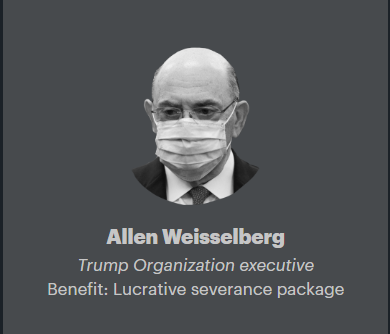Nine witnesses in the criminal cases against former President Donald Trump have received significant financial benefits, including large raises from his campaign, severance packages, new jobs, and a grant of shares and cash from Trump’s media company.
The benefits have flowed from Trump’s businesses and campaign committees, according to a ProPublica analysis of public disclosures, court records and securities filings. One campaign aide had his average monthly pay double, from $26,000 to $53,500. Another employee got a $2 million severance package barring him from voluntarily cooperating with law enforcement. And one of the campaign’s top officials had her daughter hired onto the campaign staff, where she is now the fourth-highest-paid employee.
These pay increases and other benefits often came at delicate moments in the legal proceedings against Trump. One aide who was given a plum position on the board of Trump’s social media company, for example, got the seat after he was subpoenaed but before he testified.
Significant changes to a staffer’s work situation, such as bonuses, pay raises, firings or promotions, can be evidence of a crime if they come outside the normal course of business. To prove witness tampering, prosecutors would need to show that perks or punishments were intended to influence testimony.White-collar defense lawyers say the situation Trump finds himself in — in the dual role of defendant and boss of many of the people who are the primary witnesses to his alleged crimes — is not uncommon. Their standard advice is not to provide any unusual benefits or penalties to such employees. Ideally, decisions about employees slated to give evidence should be made by an independent body such as a board, not the boss who is under investigation.
[Former U.S. attorney for the Eastern District of Michigan, Barbara McQuade] said these cases are difficult to prove, even if the intent were actually to influence testimony, because savvy defendants don’t explicitly attach strings to the benefits and would more likely be “all wink and a nod, ‘You’re a great, loyal employee, here’s a raise.’”
One Trump aide who plays a key role in multiple cases is a lawyer named Boris Epshteyn, who became an important figure in Trump’s effort to overturn the results of the 2020 election.
In early August 2023, the special counsel charged Trump with conspiracy to defraud the United States and conspiracy to obstruct an official proceeding as part of an effort to overturn the 2020 election. A couple weeks later, the Georgia grand jury handed down an indictment accusing Trump of racketeering as part of a plot to overturn the election results in the state. From November 2022 to August 2023, the Trump campaign had paid Epshteyn’s company an average of $26,000 per month. The month after the indictments, his pay hit a new high, $50,000, and climbed in October to $53,500 per month, where it has remained ever since.
Epshteyn is a contractor with the campaign and the payments go to his company, Georgetown Advisory, which is based at a residential home in New Jersey. The company does not appear to have an office or other employees. Campaign filings say the payments are for “communications & legal consulting.”
Criminals easily avoid culpability for witness tampering by offering easy excuses, e.g., increased pay or benefits to witnesses were for taking on more work or new duties. It is easy to come up with excuses.
After a weekend full of crisis-actor-level tears from right-wing conspiracy theorist Alex Jones, he has officially moved to liquidate all of his assets in order to pay the $1.5 billion he owes to the families of children murdered at Sandy Hook Elementary.
The “hoax”-pushing supplement hawker, who was found guilty of defamation in 2022, filed for bankruptcy under Chapter 11 that same year, ....The decision came after Jones posted several videos of himself in hysterics, in which he wailed over the prospect of selling his media company. “All we’re trying to do is save America, and they’re fucking us over, over and over again,” he sobbed in an “emergency broadcast” on Saturday. “And it’s just so sick—it’s sick, it’s sick. I want to leave—because it’s going to be over, folks.”
A unique detail of Jones’s case is that he can’t skirt payments by declaring bankruptcy. The judge who presided over Jones’s bankruptcy filing last year made his debt “non-dischargeable” through bankruptcy, meaning he has to continue paying the families until he has fully settled the $1.5 billion debt.
As a result, Jones will likely be “basically broke now for the rest of his life,” Harry Litman, a former U.S. attorney, told MSNBC at the time.

























